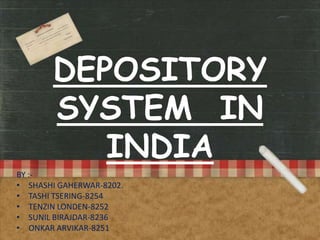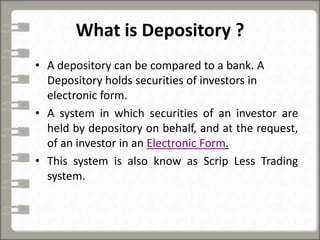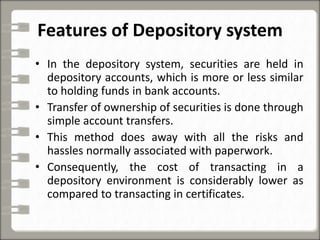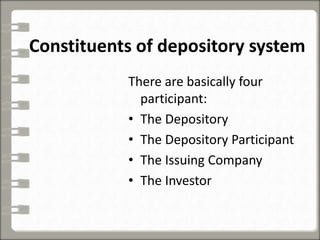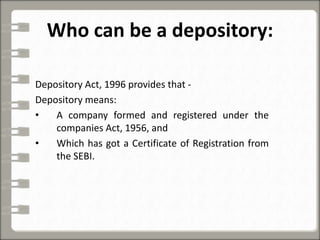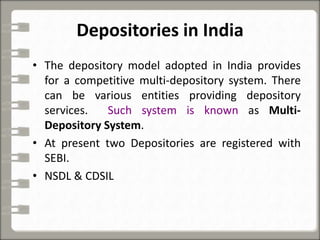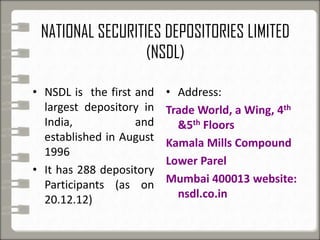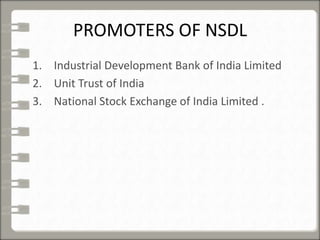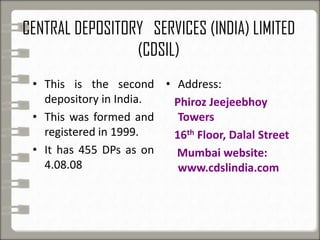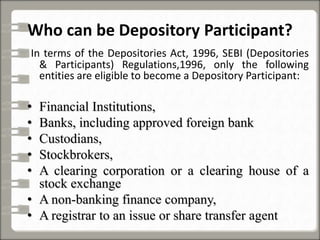Depoitory system IN INDIA
- 1. DEPOSITORY SYSTEM IN INDIA BY :• SHASHI GAHERWAR-8202. • TASHI TSERING-8254 • TENZIN LONDEN-8252 • SUNIL BIRAJDAR-8236 • ONKAR ARVIKAR-8251
- 2. What is Depository ? • A depository can be compared to a bank. A Depository holds securities of investors in electronic form. • A system in which securities of an investor are held by depository on behalf, and at the request, of an investor in an Electronic Form. • This system is also know as Scrip Less Trading system.
- 3. Features of Depository system • In the depository system, securities are held in depository accounts, which is more or less similar to holding funds in bank accounts. • Transfer of ownership of securities is done through simple account transfers. • This method does away with all the risks and hassles normally associated with paperwork. • Consequently, the cost of transacting in a depository environment is considerably lower as compared to transacting in certificates.
- 4. Constituents of depository system There are basically four participant: • The Depository • The Depository Participant • The Issuing Company • The Investor
- 5. Who can be a depository: Depository Act, 1996 provides that Depository means: • A company formed and registered under the companies Act, 1956, and • Which has got a Certificate of Registration from the SEBI.
- 6. Depositories in India • The depository model adopted in India provides for a competitive multi-depository system. There can be various entities providing depository services. Such system is known as MultiDepository System. • At present two Depositories are registered with SEBI. • NSDL & CDSIL
- 7. NATIONAL SECURITIES DEPOSITORIES LIMITED (NSDL) • NSDL is the first and largest depository in India, and established in August 1996 • It has 288 depository Participants (as on 20.12.12) • Address: Trade World, a Wing, 4th &5th Floors Kamala Mills Compound Lower Parel Mumbai 400013 website: nsdl.co.in
- 8. PROMOTERS OF NSDL 1. Industrial Development Bank of India Limited 2. Unit Trust of India 3. National Stock Exchange of India Limited .
- 9. SHAREHOLDERS OF NSDL • • • • • • • • • • State Bank of India Oriental Bank of Commerce Citibank Standard Chartered Bank HDFC Bank Limited The Hongkong and Shanghai Banking Corporation Limited Deutsche Bank Dena Bank Canara Bank Union Bank of India
- 10. CENTRAL DEPOSITORY SERVICES (INDIA) LIMITED (CDSIL) • This is the second • Address: depository in India. Phiroz Jeejeebhoy • This was formed and Towers registered in 1999. 16th Floor, Dalal Street • It has 455 DPs as on Mumbai website: 4.08.08 www.cdslindia.com
- 11. PROMOTERS OF CDSL • • • • • Bombay Stock Exchange Limited Bank of India, Bank of Baroda, State Bank of India and HDFC Bank
- 12. SHAREHOLDERS OF CDSL • • • • • • • Standard Chartered Bank Centurion Bank of Punjab Ltd Canara Bank Union Bank of India Bank of Maharashtra Jammu and Kashmir Bank Limited The Calcutta Stock Exchange Association Limited • Others
- 13. Who Is Depository Participant: • A Depository Participant (DP) is an agent of the depository through which it interfaces with an investor. • A DP can offer depository services only after it gets proper registration from SEBI. • A DP is just like a Branch of a Bank .
- 14. Who can be Depository Participant? In terms of the Depositories Act, 1996, SEBI (Depositories & Participants) Regulations,1996, only the following entities are eligible to become a Depository Participant: • • • • • Financial Institutions, Banks, including approved foreign bank Custodians, Stockbrokers, A clearing corporation or a clearing house of a stock exchange • A non-banking finance company, • A registrar to an issue or share transfer agent
- 15. Thank u

